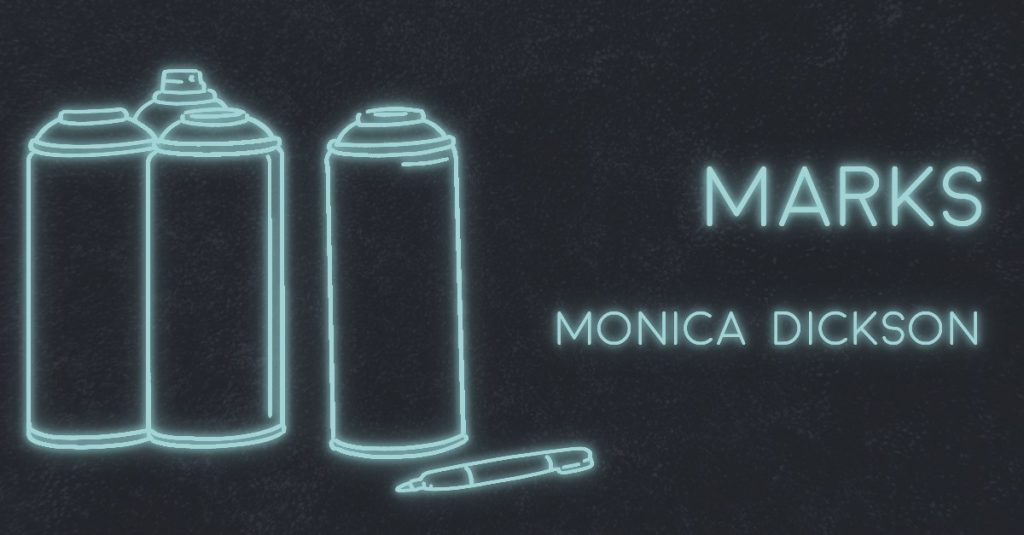‘The phantom scribbler strikes again’ – Biro on gloss, 1976
The cubicle door is freshly scarred, blue ink on institutional green. This is where John learns to read. John has been constipated since he started school. His mother takes him to the doctor and they send him to hospital where he drinks barium, so they can see what’s wrong with his insides. They let him take the x-ray home. There it is, a white cloud shaped like a question mark.
‘Fuck exams’ – Compass on wooden desk, 1981
John could do better if only he would apply himself. John is of a higher ability than his results indicate. John is not giving his ‘all’, which is a pity. John should attempt to have a more open and positive attitude instead of fostering a negative and often critical outlook. John’s success in the 11-plus requires sustained effort and full commitment, and success only comes at a price. A rather more respectful attitude to those in authority might benefit John in the future. John has a flair for the written word.
‘When two tribes go to war’ – Black permanent marker on red bus shelter, 1984
John’s mother has left John’s dad and has started going on CND marches. The shelter where John smokes is directly outside the church hall where John once went to playgroup. Play was curling up on a camp bed, under an army blanket, pretending to be asleep. Now John pretends to read the bus timetable as he makes his marks. He notices the sticker on the bin that says Keep Britain Tidy. Somebody has tried to burn a hole in the bin, and the melted plastic has hardened and curled into a black tidal wave.
‘Neither work nor leisure’ – Matt white masonry paint on viaduct, 1990 (‘heaven’ style)
John has been signing on for two years. He is told that he has to take Action For Employment. He turns up at the dole centre every day and writes stories about job-seeking for job-seekers with a ‘positive outlook’. Sometimes they print them, unabridged, in the A4E newsletter. When they are not arguing, he and his mate, Dave, an unemployed photographer, wander round the city centre talking to other unemployed people and taking pictures of buildings where employed people work. Back at his bedsit, John practises writing upside down and right to left. One night, when the tracks are quiet, John hangs over the side of the bridge. His message drips onto the empty road below.
‘More than words’ – Cursive on mashed potato (Shepherd’s pie), 1993
John has cooked the tea. Dave has gone off to Uni to study photography and his was-girlfriend, Sal, has moved in with John. Sal is having his baby so John and Sal are trying to get to know each other, sober. Sal is an artist too. She makes work from found objects and creates installations. John studies the signs next to her exhibits and tries to make sense of them. Sal heaves herself and her materials around the studio, repositioning, taking things away, making tiny, important adjustments to what she is trying to say.
‘This family is fake’ – High performance acrylic paint in red on exterior wall of 3-bed semi, 1997
Solvent Dave
MET:
Practical Sal
AT:
Dave’s graduation
TO:
Act like they’re happy
HE SAID:
I’ve got the time if you’ve got the inclination
SHE SAID:
What could possibly go wrong
SO THEY:
Bought a Barratt Home near a primary school (Good with Outstanding Features)
AND THE WORLD SAID:
Can you blame them?
‘The habitable biosphere is illegal’ – Black spray paint on permissive path, 2001
John cycles along the canal, where the water is fringed with a cappuccino-like froth. He brings his daughter, Jess, to school this way and she stops to look at the heron, the kingfisher, the fly-tipping, with equal awe. They see another sign, upright on the towpath. Beneath the tags, the local authority typeface warns, ‘Defacing this notice can result in prosecution’.
‘Dirtier than an MP’s expenses’ – reverse graffiti on white van rear, 2009
John has moved on and John is stuck. He is tired, all the time. John knows that the wrong is outside of him, that x-rays and tests will show nothing. He drives to work. He drives home again. He listens to the news then uses his flair for the written word to sign online petitions and argue with strangers on BBM. Jess kisses his cheek, calls him ‘armchair activist’ and ‘dickhead’. John could do better if only he would apply himself.
‘Life not death for my grand-kids’ – red, eco-friendly chalk spray on stone cladding, 2019 (stencil type)
John and Jess make cardboard banners while her baby sleeps. They work quickly, using throw up and blockbuster lettering, simple, like the children’s messages: There is no planet B. Denial is not a policy. John studies their signs, and the words of the children, with equal awe. One, in particular, sticks. I could be learning history but I’d rather be changing it. John is giving it his all.

